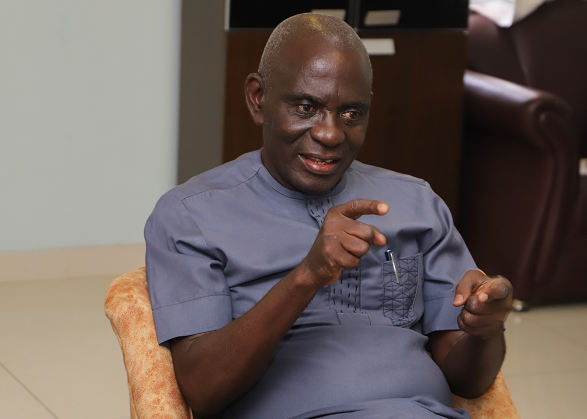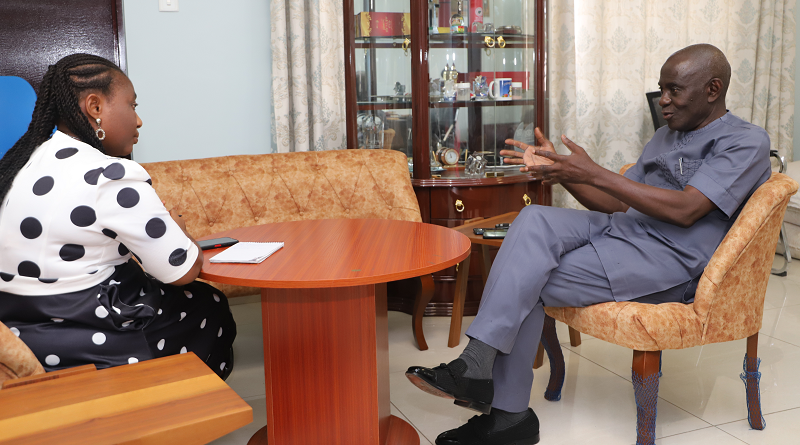
Agric revival rests with BoG — Odoom
The Ghanaian policy advisor behind Nigeria’s successful rice production story, Abraham Dwuma Odoom, has called on the Bank of Ghana (BoG) to support the agricultural sector with funding and technical expertise to help revamp the sector.
That, he said, would address the food insecurity issues in the country.
Advertisement
He said the full intervention of the central bank would help to ensure supply of funds to augment those provided by banks and other financial institutions.
In an interview with the Daily Graphic in Accra, Mr Odoom, who is a former Member of Parliament (MP) for the Twifo Atti Morkwa Constituency in the Central Region, said it was possible to replicate the Nigerian example in Ghana if the factors were right.
“The reorganisation, the reorientation, the readiness and especially the highest cooperation of the central bank of Nigeria and the decision by the bank to support the idea and provide the support for farmers as an intervention to cut the cost of importing the commodity helped greatly.
“They were spending about $6 billion on importation of rice so just imagine how much they have saved,” he said.
He said after a meeting with all stakeholders in the rice value chain and the central bank, the “Anchor Borrowers Programme” was launched by the bank under which farmers were given loans and the technical support needed to expand production.
Eventually, Mr Odoom said, Nigeria moved from 1.5 tonnes to around seven, producing with the same number of inputs. Therefore, the farmers were able to pay back all the loans that they took.
Nigeria’s story
Rice consumption in Nigeria doubled from 2008 to 2021 at a compound annual growth rate (CAGR) of more than seven per cent, reaching 6.3 million tonnes annually, making Nigeria the largest rice consumer in Africa.
The rice market is estimated at $5.2 billion and expected to grow to $6.3 billion by 2025. Of the amount, local rice holds 80 per cent of the market.
In 2021, the country recorded nine million metric tonnes as a result of a deliberate policy plan, implemented at least over the last seven years, to increase production of the staple to meet local demand of about seven million metric tonnes per year.
Odoom’s magic
Behind that success story is Mr Odoom, who in 2014, developed the concept note for achieving rice self-sufficiency while serving as policy advisor under the Competitive Africa Rice Initiative As part of his responsibility, he visited the various states and local governments known for rice production in the country, took note of the concerns of the stakeholders, particularly, the local farmers, and put together a plan that would resolve the concerns of the rice farmers to help improve local production.
In order to fi nd a lasting solution to the main challenge, he also held deliberations with the Governor of Nigeria’s Central Bank and the head of the country’s Customs.
Once they were convinced about it, Mr Odoom’s report and recommendations were presented to President Muhammadu Buhari, who adopted them and and on November 17, 2015, the government introduced the Anchor Borrowers Programme to enhance rice production.
The programme had the Central Bank of Nigeria providing financing to local farmers in loans through commercial banks.
The economic implication of this policy is, before the intervention, Nigeria imported 1.3 million metric tonnes of rice from Thailand alone, but that had dropped significantly to only 2,160 metric tonnes 2021.
Worth emulating

And that intervention is what Mr Odoom is hoping the BoG would replicate in Ghana to make the local rice production industry a viable venture.
He said if the BoG would be ready to emulate Nigeria and give loans to the banks foron-lending to the farmers and others along the value chain at a special rate, Ghana had more than enough suitable farmlands across the regions for the cultivation of rice.
“The Central Region alone can produce all the rice that Ghana needs. So, tell me why we can’t do it. I’ve been to Vietnam, China, and the land they have is not even about half of what we have to produce yet we are importing rice from there.”
“Come to think of how long those rice have been on the shelves or in the warehouse, some of them five and 10 years then we import and we eat.
“I won’t say I was 100 per cent correct though, but we can pick a good aspect of it and come up with a blueprint so that every African state can use it and get out of shortfalls,” Mr Odoom emphasised.
Rice in Ghana
Ghana struggles with a huge rice deficit estimated to be around 50 per cent of total need while Nigeria recorded nine million metric tonnes (MT), produced in 2021, out of a deliberate policy plan implemented at least over the last seven years to increase production of the rice to meet local demand of about seven MT per year.
He inferred that Ghana was selected for the Competitive Africa Rice Initiative (CARI), implemented under the Cut Hunger and Poverty Foundation of the Michigan State University (MSU), in partnership with the Kufuor Foundation and the Bill and Melinda Gates Foundation, but has not been successful in bridging the deficit because the methodology was not working.
“CARI has come and gone and still Ghana is where it is. So, why don’t we eat the humble pie” and change the situation?” he asked.
Even with no formal agricultural background, led by the Central Bank of Nigeria, his contribution is being celebrated for providing technical support and direction for the programme that could be a blueprint for other African countries towards food self-sufficiency.
To confirm its success in achieving a bumper harvest of the produce in 2021, Nigeria’s President, Muhammadu Buhari, launched what has been described as the country’s single largest rice pyramids ever assembled.
Mr Odoom stressed that to be able to transform the agricultural sector, it would require greater commitment on the side of policy implementers to succeed.
Read the excerpts of the interview in the Saturday editionof the Daily Graphic.



